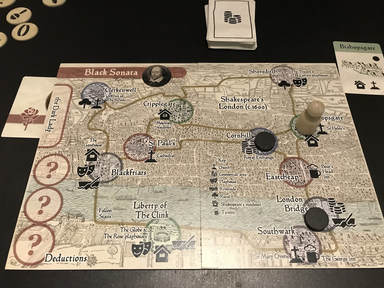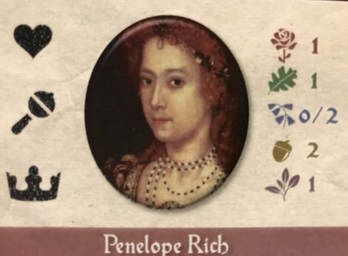 Full disclosure: A review copy was kindly provided to me by Side Room Games. What is Black Sonata about? Black Sonata, designed by John Kean, is a solitaire deduction game based on a real historical mystery: the identity of the "Dark Lady" from Shakespeare's sonnets 127–154. The object of the game is to deduce her identity by gathering clues about her, then to confront her with them. To collect clues, you must find the Dark Lady as she moves through Shakespearean London. Her movements are determined by a deck of cards with symbols that give you a hint as to her current location. If you are in the same place at the same time and successfully search for her, then you will receive a clue card that gives you information about her identity. If you fail, she further eludes your grasp. Clues are particularly interesting in this game. At the beginning of Black Sonata, one clue card is randomly selected and placed facedown beneath the game board. This card will represent the Dark Lady for the game. Every other clue card will have symbols on it, and each will also give you hints about which symbols it might or might not share with the card that represents the Lady herself. Figure out which three symbols are on the Dark Lady's card, and you can confront her and win the game. The symbols on the clue cards also, however, represent actual historical information about the women you are investigating. Each clue card features a possible candidate for Dark Lady, as well as symbols that represent things about her life. On each woman's card, you can find out whether she was married, whether she was musical, whether she had courtly connections, whether she was a bit promiscuous... Getting a sense of the lives and personalities of different historical figures while you search for the Dark Lady gives Black Sonata a lot of added interest.  Not only that, but the clue collecting process in the game is just fun. The location cards in Black Sonata can be arranged in several ways to add replayability and to increase difficulty. And the way that you check for the Dark Lady's location is ingenious. Rather than completely flip a card and ruin the mystery, you check whether she is in a given location using a tiny hole in that location's card. When you put a movement card on top of a location card and flip them over together, you will either see the Dark Lady's silhouette—meaning that you've caught a glimpse of her—or you will get nothing but a blank space. There are several ways to lose Black Sonata, which makes it important to be efficient and aggressive in your search. If you cycle through the location deck three times, you run out of time and lose the game. But don't get too aggressive: The cards you use to guess the Dark Lady's identity are limited, which means that too many reckless guesses can also cost you the win. On top of that, the more clues you have amassed, the faster the deck cycles, meaning that you must chase the Dark Lady all the more quickly before she melts back into the shadows of history. What I like about Black Sonata Unlike our Dark Lady, I won't be cagey: I love Black Sonata. Not only do I love games that are rooted in actual historical events, but until I played this one, I had not realized that solo hidden movement games were even possible. The fact that John Kean managed to come up with a way for solo players to enjoy this mechanic is absolutely thrilling to me. I also love the deduction and strategy required to win a game of Black Sonata. Even if you know where the Black Lady is, you still need to position yourself so that you wind up in the same location that she's in—something that is easier said than done. And the logic puzzle presented by the clue cards is delightful. Because the deck cycles more quickly as you catch the Dark Lady and gather clues about her, you need to try to deduce as much about her as you can given as little information as possible. The whole process is deliciously addictive. Whenever I finish a game of Black Sonata, I want to play it again. The historical flavor of the game is also a huge bonus for me. I found myself looking up each of the candidates for Dark Lady and learning a lot of things I didn't know before. I also ended up reading Shakespeare for the first time in a long time, just because the snippets from his sonnets that are included on the location cards piqued my interest. The game made me feel like I was starring in my own version of Possession, uncovering a great historical secret that would net me a lifetime of research grants.  Possible concerns about Black Sonata I have only one concern about Black Sonata. I have a very good memory, and if I play this game a lot of times in a row, I can often remember the symbols on a card if I have already had it recently. This is even more likely now that I've actually gone and read up on these women, and can now connect the symbols to details about their lives. In some ways, this doesn't change gameplay all that much. Even if you know which symbols are on the Dark Lady card, you still need to gather enough clues to "prove" that you're right, and then you still have to corner the Dark Lady and reveal her identity once and for all. And the movement decks add a lot of variety to the game. But it still takes a bit of the mystery out when you know who the Dark Lady is and just have to prove it. That said, you have to play the game a lot of times in a row for this to happen to you, so you're going to get your money's worth well before then—and even if you do have a memory like a bear trap, you'll be able to enjoy it again after giving yourself a rest. Should I back it? I am going to back Black Sonata, without question. The design is brilliant, the game is engaging, and I think that all solo gamers—especially those who enjoy hidden movement games and deduction puzzles—should try it. This game is like no other solo game I've ever played, and it's a delight to lose myself in the search for the Dark Lady. I feel confident recommending this one. Play Through: If you want to check out some gameplay, click below for my preview video!
0 Comments
Your comment will be posted after it is approved.
Leave a Reply. |
AuthorMy name is Liz Davidson, and I play solo board games. A lot of solo board games... Archives
August 2021
Categories
All
|
 RSS Feed
RSS Feed